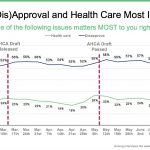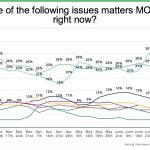As a vote for the Senate Republican proposed healthcare bill looms, with action possible as early as next week, health care is top of mind for many Americans. While its prominence as an issue has fluctuated a bit alongside the debate about Obamacare’s fate, mentions of health care have trended upward over the past six months. And as concerns about health care have spiked, President Donald Trump’s disapproval rating has typically risen along with it.

Asking both, “Do you approve or disapprove of the way Donald Trump is handling his job as president?” and “Which one of the following issues matters MOST to you right now?” each day allows SurveyMonkey to examine the American public’s changing view of the president and their top concern over time — day to day, week to week, month-to-month, year-to-year. The issue question prompts respondents to select the most important of seven broad categories of key issues: Jobs and the economy, Health care, Terrorism, Education, The Environment, Immigration, Foreign policy plus an option to volunteer another issue.

Between the lowest — 17 percent — in February and the highest 30 percent in late June, “health care” has been rising as the most important issue during 2017, with three noticeable peaks in our data. For those who disapprove of Trump’s job performance, that group ranged between 51 and 58 percent over the past six months. The general trend for these two measures appears to show them growing in tandem.
Looking at each of the three peaks:
- Late February to Early March: The first bump of 7 percentage points (17 to 24 over a 5-week period) peaked just after the Republican-proposed AHCA was released in early March. Over the same time period, Trump’s disapproval rating moved from a low of 51 percent to the highest it had been to-date, 56 percent.
- Late April to Early May: As news waned about the AHCA in the weeks immediately following its proposal, so did the portion of Americans who put health care front and center. It wasn’t until late April/early May, over a few weeks’ time, that another jump of 8 percentage points for Health care (18 to 26 percent) occurred. Up to this point, this was the highest peak for health care-concerned Americans. In these few weeks, news about the the House passing the Republican proposed American Health Care Act (AHCA) broke. Right around this time, Trump’s disapproval rating also reached the highest since he took office; 58 percent. After the AHCA passed, SurveyMonkey found that among Americans who say they would be “worse off” under the AHCA, 35 percent said health care was most important to them.
- Mid to Late June: Most striking is the largest week-to-week jump for health care since February, up seven percentage points from June 16th (23 percent) through the week of June 23rd (30 percent). Senate Republicans released their health care bill proposal, the “Better Care Reconciliation Act” (BCRA), on June 22nd. There was also news released from the Congressional Budget Office (C.B.O.) where their report estimated and additional 22 million more people would be left uninsured under the Senate proposal. Both the BCRA and the C.B.O.’s estimate received much media attention and could be key drivers pushing health care to the top of the American collective conscious.
Even with new revisions to the proposed Senate republican health care bill, it appears even before a vote, it is reportedly close to imploding, perhaps because the increased news coverage is drawing attention to an unpopular proposal. And while this bill might be on the verge of defeat, Americans’ worries about health care aren’t likely to fade.



